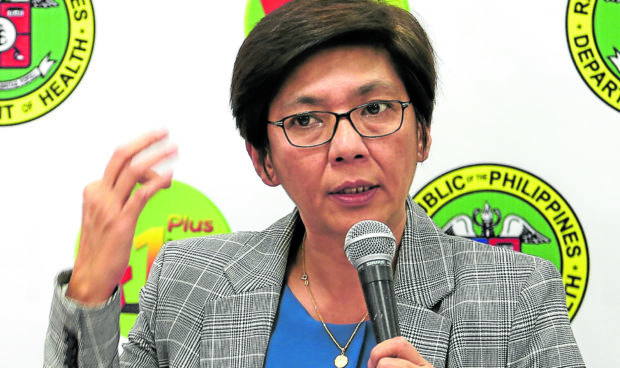MANILA, Philippines — The Department of Health (DOH) on Monday said COVID-19 cases in Metro Manila have “plateaued in the recent week,” or attained a level of relative stability, amid the further loosening of restrictions in the capital region.
But Health Undersecretary Maria Rosario Vergeire warned that there was still “a high probability that cases will go up again.”
She noted the “continuous increase in mobility and decrease in compliance with safety protocols and crowding in places.”
There has been a general decline nationwide in daily new cases, with its average going down by 15 percent from 2,314 in the period of Nov. 1 to Nov. 7 to 1,988 in the period of Nov. 8 to Nov. 14.
But the latter period also saw a slight increase in daily new cases in the National Capital Region (NCR), from 404 in the period of Nov. 1 to Nov. 7—when restrictions in the metropolis were eased to alert level 2—to 435 between Nov. 8 and Nov. 14.
‘Sustain the gains’
Still, Metro Manila and the other regions remained at low risk, with the exception of the Cordillera Administrative Region which was classified at moderate risk due to its high hospital occupancy.
Vergeire reminded anew local governments, business establishments and the general public to strictly comply with health protocols like wearing face masks and face shields and observing physical distancing.
“It is not impossible for NCR to deescalate to alert level 1 by December. We just need to sustain the gains we have now,” she said.
Vergeire also said it was crucial that at least 70 percent of the vulnerable groups and 50 percent of the target population in Metro Manila were vaccinated.
According to the DOH data on the capital region, more than 70 percent of the elderly and less than 70 percent of people with medical conditions have been vaccinated.
At Monday’s Laging Handa briefing, Dr. Benito Atienza, president of the Philippine Medical Association, said his group would deploy 5,000 interns for the government’s planned three-day vaccination drive from Nov. 29 to Dec. 1
He said nursing students would be tasked as data encoders while those studying to become doctors would be the vaccinators.
Also at that briefing, Undersecretary Emmanuel Rey Caintic of the Department of Information and Communications Technology (DICT) called on local governments to hire more data encoders to manage the registration of people who wish to avail themselves of that vaccination schedule. He said 50,000 encoders were needed for that task.
Virus case update
Caintic said data encoding was important because more destinations were now requiring vaccination certificates instead of swab tests.
He also said the DICT was looking for volunteers among the youth and the private sector, in such industries as information technology and business process outsourcing.
The DOH reported 1,547 new cases on Monday, bringing the country’s total COVID-19 cases to 2,818,511.
Monday’s case bulletin showed there were 27,025 active cases, of which 61 percent were mild, 5.9 percent were asymptomatic, 17.6 percent were moderate, 10.8 percent were severe and 4.6 percent were critical.
There were 2,601 new recoveries, bringing the total survivors to 2,745,777, and 128 more deaths, pushing the death toll to 45,709.
Out of 39,147 who were tested last Saturday, 4.1 percent, or 1,605 were positive of the coronavirus.
